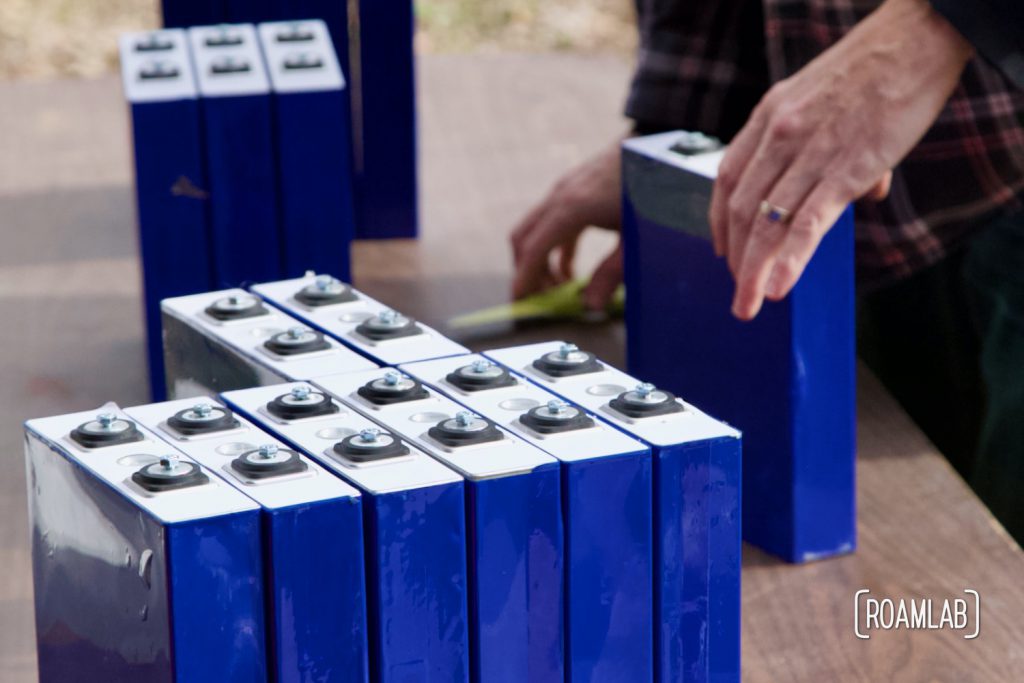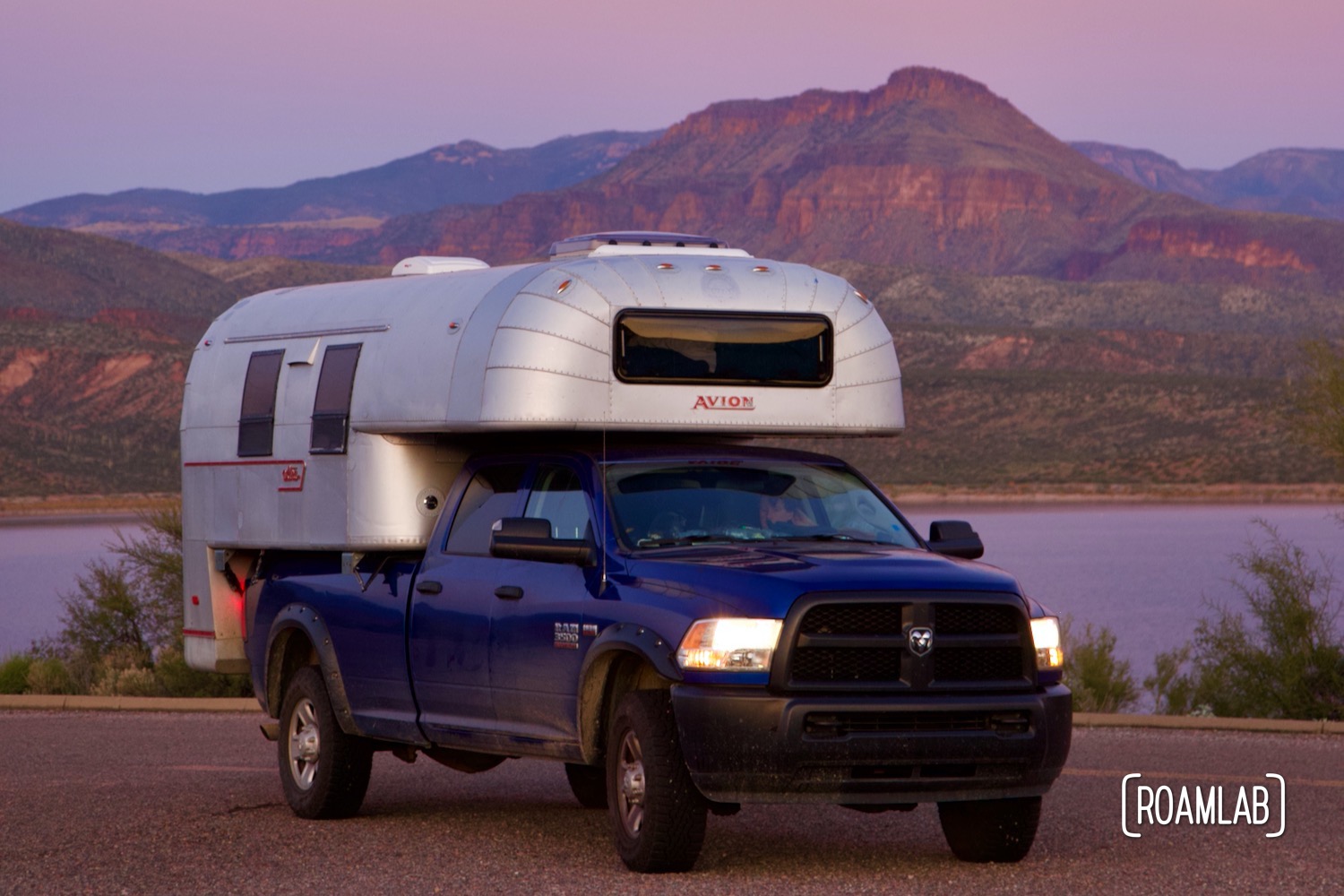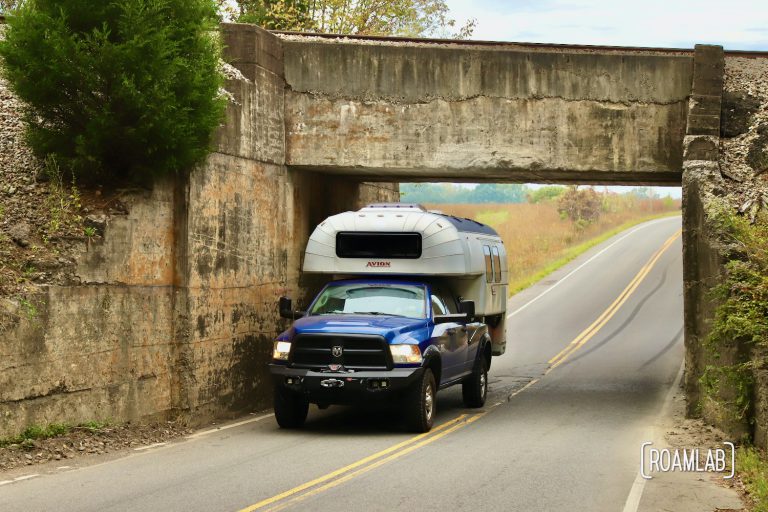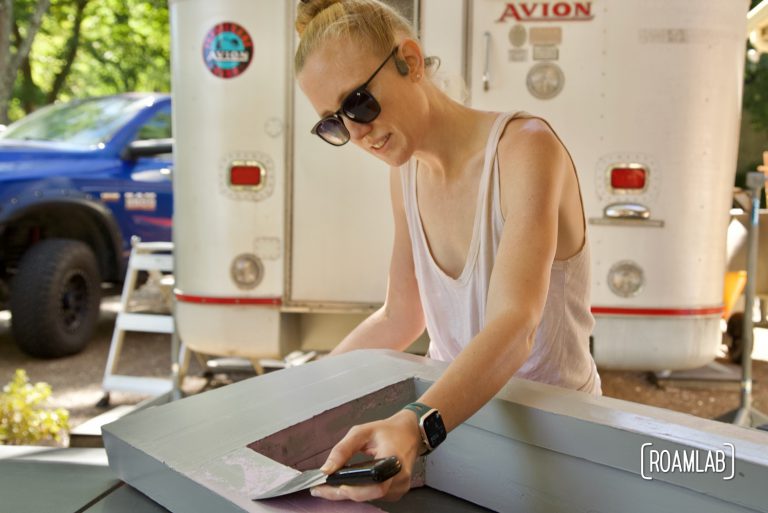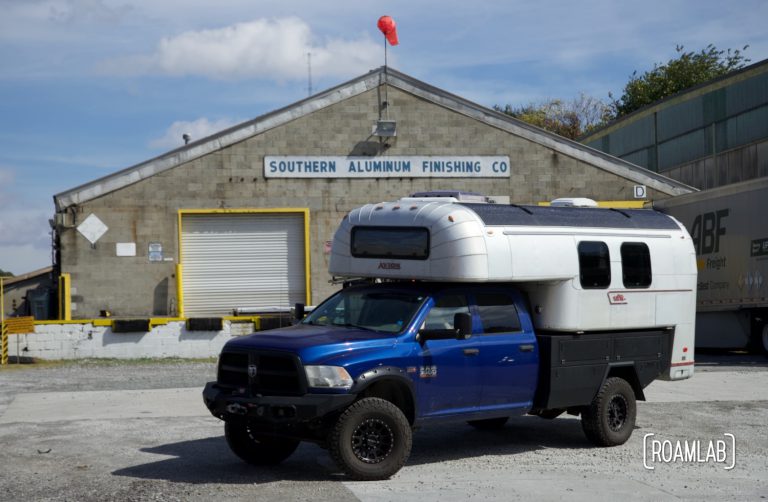There’s a lot of consideration that goes into purchasing a lithium battery for a camper. If you are replacing a battery in a preexisting system, you may choose to just buy a replacement battery with specifications that are similar to your last battery. But odds are that you want some kind of upgrade. More power is better and you are more likely to run out of money and space for batteries before running out of uses for them. We are building out a completely new electrical system for our 1970 Avion C11 truck camper restoration. So everything is on the table. We’ll walk you through all the options, what we chose, and why.
Key Features of a Lithium Battery
When buying a battery, you can easily be overwhelmed by all the technical specifications. There’s a lot of different ways batteries are marketed and oftentimes it’s difficult to make side by side comparisons. So, we are going to walk you through how we came to our conclusions on battery chemistry, voltage, amperage, and dimensions.
Which Lithium Battery Chemistry
The term “lithium battery” encompasses a wide range of batteries. While, as the name suggests, lithium batteries involve lithium, they also can have a wide range of chemical makeups to optimize difference characteristics. We touched on battery chemistry earlier in our post on selecting the Best Camper Battery. But it’s worth digging into the issue.
Do you remember those exploding cell phones that were banned from plane flight? Those were lithium ion batteries. And volatility should be one of your key considerations when buying a battery since it’s going to be inside your very tiny home. That’s why we recommend lithium iron phosphate or LiFePO4 batteries. Some lithium battery companies also refer to these batteries as lithium ferro phosphate (LFP) batteries. LiFePO4 batteries are the safest of the currently available lithium batteries and the best for solar storage purposes. We don’t really consider any other lithium battery chemistry worth considering at this time.
Battery Voltage (V)
Battery voltage is another issue that is often glossed over. Most campers are wired for 12-volt systems. A lot of RV-specific appliances are built to be powered on 12-volt. So, most people will follow suit with 12-volt batteries or two 6-volt batteries wired in series. But this isn’t necessarily the best call. 12-volt systems require a lot of extra amperage to power them than systems with higher voltage. And high amperages can be dangerous due to higher fire risk which requires extra consideration. That means thicker (and more expensive) wires are needed to support that amperage. 12-volt appliances tend to cost more for the same reason. Of course, if you already have a camper and appliances wired for 12-volts, you might as well stick with 12-volts. But if you are starting from scratch, or are expanding your rig’s system, you may want to take a different route.
The rising popularity of solar is a significant reason why camper owners are moving away from 12-volts. Since lower voltages require a higher amperage to move the same amount of power, it is not cost effective or safe to be running continuous currents over 100 amps. This means that a 12-volt system limits how much power can be collected from solar panels. This isn’t much of a problem for a one or two panel system. But, if you want a system that can support more than 1000 watts of solar, you really have to move up your voltage.
Other Options
If not 12-volt, then what? Most houses in the United States are built for 120-volt systems. To that end, most domestic electric appliances are built for 120-volt systems. Heck, most RVs are already wired for 120-volt power when hooked up to shore power. And many RVs include an inverter to boost voltage up to 120-volts when needed. So why not just bite the bullet and be an all 120-volt system? For starters: high voltage is dangerous! Ever notice those warning signs around power lines? There are circumstances where high voltage applications are called for. But in your camper’s battery system, you should avoid anything more than 50-volt systems.
A lot of DIYers are now wandering into the realms of 24-volt or 48-volt systems. The voltage is still very achievable for the average RV setup while optimizing for lower amperage systems. You may be surprised to discover how many RV appliances include a 24-volt hookup along with the 12-volt hookup. For those that are only 12-volt, stepping down the voltage is very simple and much less complex than stepping up. And when you do need to step up to 120 volts, the leap is more efficient.
We opted for a 24-volt system. By doubling our voltage, we move out of the danger zone for amperage and can affordably support our camper’s needs as well as the solar power system we will be installing.
Battery Amperage or Amp Hours (Ah)
When discussing batteries, the term often bandied about is “Amp Hours.” This is short for ampere hour and is often shortened to Ah. Amp hours describe the battery capacity or the amount of electric charge that can be delivered at the rated voltage over a set period of time. For simplicity’s sake, we can consider this to represent the total number of amps a battery can hold in a single charge.
Once you have settled on the voltage of your system, we can increase or decrease the total amount of power a battery can store by selecting batteries with higher or lower amp hour ratings. In the RV world, you are most likely to stumble upon battery arrangements featuring 12V batteries with 100 Ah batteries. This would be a 1200 watt battery, since watts = volts X amps. Now, if you wanted more watts, you could buy a larger battery, say a 200 Ah battery, or two 100 Ah batteries. But I’ll go into this more in a later post. Suffice it to say that your average RV will come equipped with a 12-volt 100Ah battery but you could probably use more if you had it.
With a 24-volt system and a daily watt hour usage of about 5 kilowatts as ball parked in our post How Much Power Do I Use In A Day, we can calculate amp hours: dividing wattage by 24 volts. This comes out to over 200 amp hours. For your average vacationer, this may seem like a lot, but not for a pair of software developers living off grid.
Battery Dimensions
Most battery compartments in campers are designed with car battery dimensions in mind. And there certainly are lithium batteries designed to be dropped into these arrangements. That said, more capacity means bigger batteries or, at least, more batteries. So, if you want to increase the battery storage in your camper you need to be aware of how much physical space is available to store the larger batteries.
In our case, we are building our own storage space for the batteries, so we have a lot of flexibility. Though lithium batteries are relatively light compared to their lead acid predecessors, they are still heavy. We settled on a system that demands 24 volts and 360 amp hours. A 8,640 watt battery is HUGE. So we will be breaking that down into a couple batteries makes our battery situation easier to move and arrange within the camper.
Lithium Iron Phosphate Battery Vendors
While we know what we want, where to get it is a whole other question. As lithium batteries become more common and acceptable, the number of vendors has expanded. To get a gauge of the landscape and pricing for LiFePO4 we made the table comparing the price per watt of similar batteries by different retailers. This table is in no way comprehensive. But you can get a sense of the average price and variation among vendors.
| Vendor | Chemistry | Volts* | Amp Hours | Watts | Price | Dollars / Watt |
|---|---|---|---|---|---|---|
| Battle Born | LiFePO4 | 12 | 100 | 1200 | $949 | 0.79 |
| Victron | LiFePO4 | 12 | 90 | 1080 | $1,126.25 | 1.04 |
| Renology | LiFePO4 | 12 | 100 | 1200 | $899.99 | 0.75 |
| Simpliphi | LiFePO4 | 12 | 102.4 | 1228.8 | $1,375 | 1.12 |
| Dakota | LiFePO4 | 12 | 100 | 1200 | $899 | 0.75 |
*It’s worth noting that the LiFePO4 chemistry has a nominal voltage of 3.2. So, when they are arranged to increase their voltage to 12 or 24 volts, we are actually talking about multiples of 3.2. So, 12.8 or 25.6 volts.
There are a lot of reasons for the variation in price. Victron, for example, is a major presence in electrical system components. If you are buying a Victron charger, inverter, solar controller, or other products for your system, the Victron battery will fit nicely into that streamlined system but at a cost that makes it a little less popular to the average RVer. In comparison, Battle Born has become a major presence in the RVing sphere. They have found a sweet spot between price, reliability, and customer service that has a lot of fans. Meanwhile, Renology benefits from a similar play to Victron. Their solar kits and other products make for a simple package for a more price conscious consumer.
(Do you have other vendors we should mention? Let us know in the comments.)
Making The Choice
I’m sure the same thing occurs to you as it occurred to us: man, that’s expensive. As much as our logical minds crunch the numbers and recognize that these LiFePO4 batteries are safer, lighter, longer lasting, and a better overall price (when correcting for life-expectancy) that $1000 price tag definitely cools our engines. After all, we aren’t shopping for a 12-volt 100Ah system. We are building a system at least 7 times that amount. And, no we aren’t prepared to lay down $7000 on batteries alone. But there is another possibility.
Why Not Your Own Lithium Battery?
A lithium battery may seem like a crazy thing to build yourself. But the components to make a battery are available. Where savvy shoppers may hunt down retail batteries at a discount, it can’t even compare to the money saved when making a battery yourself. Of course, this comes with a steep learning curve. There’s a lot to understand before starting your battery build.
And how can I say this? Because that is the choice we have chosen. Yes, we are building our own batteries. This is the beginning of our new series about building a DIY battery. As we progress, we will update you with what we learn and do. Feel free to pepper us with questions and suggestions in the comments.
